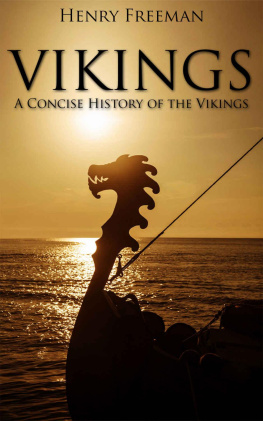ON A SUMMER DAY NEARLY twelve hundred years ago, three ships with bright red sails drew near to one of the little ports of the Dorset coast in the south of England.
The townsfolk saw the ships, and paying no heed to the bright sails, said carelessly one to another, The merchantmen will be in port to-day. And the harbour-master gathered together a few of his men and hastened to the quay. For he, too, had seen the ships, and, as in duty bound, he went to meet them, to demand from the captains the port taxes which were lawfully due to the king.
But townsfolk and harbour-master alike had made a grievous mistake that summer day. For, as they soon discovered to their cost, and as the red sails might have forewarned them, the three ships were no peaceful merchantmen.
No sooner had the vessels drawn up along the quay than a wild, strange-looking crew sprang to the shore, drew their swords, and speedily slew the harbour-master and his few unarmed followers. They then entered the town, plundering and burning the houses of all, both rich and poor. Leaving the little town in ruins, the strange crew, dragging their booty with them, marched down again to the quay. There they embarked, and without delay sailed away out to sea. Perhaps you have already guessed that the strange crew was a Viking band, that the three ships were Viking ships. So, indeed, they were, and this summer day in the year seven hundred and eighty-nine was the first time that the wild Northmen had been seen in England, or in any part of Europe where the White Christ was worshipped.
But it was not long ere the bright-coloured Viking sails grew to be dreaded in England and also on the Continent. Their very appearance struck terror into the hearts of all men. Monks and armed men alike learned to flee dismayed before the fierceness of the wrath, the violence of the blows, of these foes who had come upon them from the distant North.
As the months and years passed, Viking bands, not with three ships alone, but with large fleets, came to invade and harry the land. Leaving their vessels to be guarded by a third of their number, the others marched into the open country to plunder the inhabitants. Should these venture to defend their goods, the Vikings did not hesitate to slay them or to carry them off as slaves.
Churches or monasteries in those days were the special spoil of the Northmen. For they knew that in these buildings they would find the richest store of gold and silver. Nor was there any reason why the warriors should spare the sacred buildings more than they spared the houses of the people. For the Vikings were pagans. That is to say, they were worshippers of their own gods Thor and Odin, the gods of storm and battle, and for priests and monks they had little respect and less fear.
Now it happened in those days that the holy men or women who founded monasteries, and reared churches dedicated to Christ and the saints, ofttimes chose as a site for these buildings some lone island, or some bold headland over which the storms would dash on wild and wintry nights. It was easy for the sea-rovers to reach such sanctuaries.
One of the most famous of these monasteries had been founded by St. Cuthbert on Lindisfarne or Holy Island, a sea-girt island off the coast of Northumberland. Here, four years after their attack on the little Dorset town, the red sails of the Vikings were once again to be seen. The monastery was no fortress built for defence, and the Vikings having landed at Lindisfarne, had not any difficulty in entering it. They slew the defenceless monks, took all the gold and silver that they could find, and burnt the monastery to the ground. Then, well satisfied with their adventure, they sailed away from Lindisfarne.
Other bands of sea-rovers now appeared here or there. One such band was seen on the south coast of Wales, and, after harrying there, sailed to Dublin bay. Here they found an island monastery which they treated as their fellows had treated the monastery of St. Cuthbert.
The success of these expeditions encouraged the Northmen to come in ever greater numbers to our western shores, while some among them sailed to France, to Italy, and to Spain. Even on the shores of the Black Sea and in Greece the tall Northmen with fair skins, blue eyes, and golden hair were known and dreaded.
In our own land the Northmen were next seen by the inhabitants of Iona, on the west coast of Scotland.
Iona is hallowed to all boys and girls. They remember that on its lonely shore St. Columba landed when he was banished from the fair green isle of Erin. They remember, too, that he founded there his famous monastery, from which teachers went throughout Scotland and even to foreign lands to tell the story of the Cross. But the Vikings came to Iona, and they plundered the monastery there as ruthlessly as they had plundered any other sanctuary.
Then in many a church throughout the British Isles a new petition was added to the Litany, and the solemn and heartfelt cry arose, From the fury of the Northmen, good Lord deliver us.
These forays all took place before the ninth century was many years old. They were but summer expeditions which the Vikings undertook for the sake of adventure, and for the love of plunder.
But before the end of the ninth century the Northmen had ceased to sail away to sea as soon as they had plundered a town or district. They had begun to think that it would be well to settle in the places which they could so easily make their own.
Accordingly they dwelt during the winter months in the castles or strongholds which they had pillaged. These strongholds might be in Scotland, where the power of the Pictish kings was growing too weak to strive with the bold adventurers; they might be in Ireland, where the chiefs were too busy warring with each other to pay much heed to the tall, fair strangers who were settling along their coast or in any other district which they had subdued.
Here, then, in different strongholds, the wild men of the North would dwell, sometimes helping against their foes the chiefs among whom they had settled, sometimes aiding the foes against the chiefs. But when summer came, the longing to rove would come upon them once more and they would sail away to plunder fresh towns, to capture other ships.
So eager, indeed, were the Vikings for adventure, so keen their thirst for battle, that if they could find no strange foe to fight they would challenge another band of Vikings to combat. Then swords would flash, arrows speed their flight, until the deck of one or other of the Viking ships was cleared, the crew killed or taken prisoners, and the ship with its treasures became the property of the conqueror.












